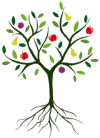Cornish Aromatic
Cornish Aromatic is a high-quality late-season dessert apple from Cornwall, with an attractive red / russeted skin.
In a good year the flavour can be excellent - a rich pear-drop note to the firm flesh.
Cornish Aromatic apple trees for sale
RF11-year bare-root
tree
on M116 rootstock£34.95
Mature height: 2m-3.5m after 10 years
Can be grown on as a large free-standing apple tree, a small half-standard apple tree, or a large apple fan or espalier. Available next season
RF21-year bare-root
tree
on MM106 rootstock£34.95
Mature height: 3m-5m after 10 years
Can be trained on as a large free-standing apple tree, a half-standard apple tree, a large apple fan or espalier, or a pleached apple tree. Available next season
Growing and Training
Cornish Aromatic is well-suited to the mild wet climate of the Cornish peninsula, and is generally a good choice for areas with wet climates because of its natural resistance to scab, a disease which is more prevalent in wetter areas. However to get the best flavour try to plant it in a spot that gets maximum sunshine.
Recommended pollinators for Cornish Aromatic apple trees
Cornish Aromatic is not self-fertile, so you will need another different but compatible variety planted nearby in order to produce fruit.
The following varieties are good pollinators for Cornish Aromatic.
If you are not sure about pollination requirements don't hesitate to ask us.
Red WindsorRed Windsor is one of the easiest to grow of all dessert apple trees, and with a pleasant apple flavour.
BountifulBountiful is an easy-to-grow cooking apple, it retains its shape when cooked, fairly sweet for a cooker.
GreensleevesGreensleeves is a reliable and popular mid-season green/yellow apple, easy to grow and productive.
Egremont RussetEgremont Russet is the most popular English russet variety, and a good apple tree for the garden.
BardseyA hardy disease-resistant apple, discovered growing on an island off the west coast of Wales.
Keswick CodlinKeswick Codlin is a popular early-season cooking apple, easy to grow, and productive in most climates.
Red SentinelMalus Red Sentinel has classic white blossom and a profusion of tiny scarlet persistent fruits.
Stirling CastleA traditional Scottish cooker from the Victorian era, with a good sharp flavour.
History
Known from Cornwall, England, early 19th century, but probably older.
Cornish Aromatic characteristics
- Gardening skillAverage
- Fruit persistencePersistent
- Self-fertile?Not self-fertile
- Pollinating othersAverage
- Pick seasonLate
- Picking periodmid-October
- Keeping1-2 months
- Food usesEating fresh
- Country of originUnited Kingdom
- Period of origin1750 - 1799
- Fruit colourRed
You might also like these varieties
BardseyA hardy disease-resistant apple, discovered growing on an island off the west coast of Wales.
More about apple trees
Apples are very versatile, and all varieties can be eaten or used in the kitchen. However varieties specifically grown as eating apples tend to have the best flavours for eating raw.
The main thing to decide when choosing an eating apple is when you intend to eat the apples. Early season apples are typically ready in August, and generally don't keep very long. Mid-season apples are ripe in early September, while late-season apples start to become ripe in late September and October. Many of the late-season varieties can also be stored in a fridge or cold shed for several months into the winter.
Some apple varieties are self-fertile, but most are not. However in most areas of the UK you do not need to worry whether your apple trees are self-fertile or not, as there will be other apple trees in nearby gardens to help with pollination.
